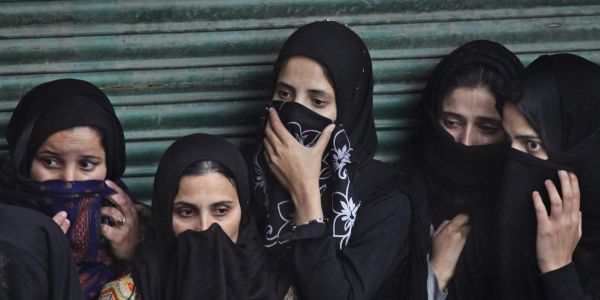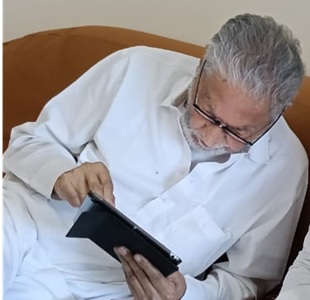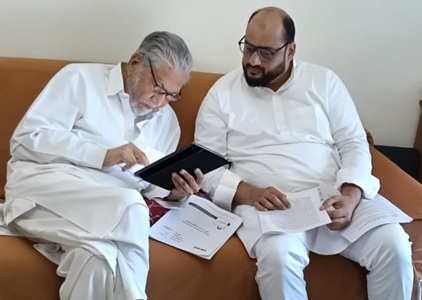 By Jawed Khurshid for Maeeshat
By Jawed Khurshid for Maeeshat
Ever since the BJP firmly ensconced itself on the pedestal of power, it remained busy flirting with issues that is closer to Muslim’s psyche. Beef, Vande Mataram, Ghar waapsi (a RSS and VHP led drive to proselytize Muslims), Article 370 and Uniform Civil Code, to name a few, keep Muslims on their toes. Raking up issues such as triple talaqs at one go is tantamount to tinkering with beehive. The obvious result would be cacophony inside the parliament and shrill protests outside on streets, alleys and even inside the safe four-walls of our very homes, which is routinely observed almost every day.
A couple of years ago, a Quranic concept of phased talaq was being tried to put in place by those who are deft in Islamic jurisprudence. The various Islamic denominations revolted as if seem to have convulsed with trauma – post phased talaq vaccine. This has made almost vertical rift in the clergy – the moderates welcomed it as departure from the oppressive triple talaq at one go. The more orthodox and rigid clergies fumed with rage, threatened to stall the AIMPLB’s progressive initiative. Among many in the erstwhile political dispensation, it was the horror Shah Banu revisited which had shorn the Congress of its cutting edge. Ever since, the Congress was sucked into the whirlpool of obscurity. Now, as they are not on the treasury benches, they are enjoying the things from the gallery, watching the ruling BJP being cornered with caustic smile.
The present political dispensation, though a right wing party, too cannot afford to tinker with the cork that prevents the djinn (demon) of Muslim rage to escape from the proverbial bottle.
Literally, nikah implies merging of two opposite sex. Once the two individuals marry they get tied to a contractual bound, which is assumed to be an everlasting bound. To breach this bound is akin to seperating two vital organs connected by life supporting system. It is an extremely delicate surgery. The surgical method applied to separate the two is the concern of scholars deft in Islamic jurisprudence and Shariat as well as Fiqeh.
In Muslim Personal Law, there is a provision of triple talaq – or the thrice recitals of talaq, talaq, talaq— which makes the separation legal (even if it is done in inebriated condition!).
However, there are two almost diametrically opposite schools of thought which interpret this crucial issue into different light. The supporter of liberal school and the president of All India Ulema Mashaikh Council, Allama Bunai Noaim Hasani when asked, Why talaq is so easy in Shariat and Why a girl who sacrifices her parental home and hearth is thrown into the vortex of arbitrary triple talaq, said, there is no scope for such talaq in Shariat, because Shariat cannot be amended or changed. It is the Fiqeh law that can be amended in the light of Holy Quran. Fiqeh laws were formulated by Islamic scholars in the light of Shariat (Holy Quran and Hadith) which govern the lives of Muslims. There are seven different Fiqehs such as Hanafi, Slafi, Shafei, etc. The fatwas are given in the light of Fiqeh.
Shariyat doesn’t permit such divorce. This article relates to Fiqeh , not Shariat. The Fiqeh that a majority of Sunnis follow is Fiqeh Hanafi which allows such talaq. However, few Islamic sects such as, Shia and Ahle-Hadith condemn such unethical practice which has became means to traumatise Muslim women. Unfortunately in India, roughly 70% Muslims still believe in triple talaq.
A couple of years ago, AIMPLB proposed to draft such nikahnama which had the provision of increment in the amount of Meher (alimony). This was mooted to stem the rot. Unfortunately it met with vehement protests, both from the liberals as well as the orthodox sections of Muslim society.
Most believe it has an ominous portent. It is like resorting to one evil to remove the other. They contend, this will make nikah more expensive and difficult for millions of Muslims those who are financially at the edge. Besides, this could trigger rape and violence, a natural corollary of such myopic policy. And thus would be contrary to the spirit of Islam, which warns us against making nikah difficult.
At times, the groom’s in-laws employ coercive methods to get his (husband’s) approval to divorce his wife. Does Shariat allow talaq under such circumstances? Hasani said only Fiqeh Hanafi permits such talaqs. Other Fiqehs have no such provisions.
Many believe talaq is damn easy in Fiqeh Hanafi. Ironically, this is a misconceived notion. Even in Fiqeh Hanafi talaq is not that easy as it is being portrayed. There is an alternative method of giving talaq called Leaan. Leaan can be understood by the following illustration: If a man happens to find his wife in a compromising position with another person (adultery), even under such critical condition Fiqeh Hanafi does not permit the husband to divorce his wife on the spot. The dispute must be placed before a Qazi (Judge of a Islamic Shariyat court). The qazi after hearing both the parties gives ruling that must be acceptable to both the warring groups.
The yawning problem of triple talaq at one go has tarnished the face of Islam and peeved a lot many women who find themselves at the receiving end of their husband’s haughtiness. Under such circumstances, one may contemplate how to rectify this? How could the Muslim society be bailed out from such arbitrary talaqs?
The solution to such arbitrary talaqs is mentioned by Allah in the Holy Quran in only three words in its second verse of Sura Talaq (Talaq Chapter). It says, Washhadu zu adlim minkum — “O mankind! When thou give talaq to thy wives make sure of making two judicious witnesses to this.” Thus, it becomes ample clear that any judicious and God-fearing witness won’t be a party to such imprudent act.





0 Comments